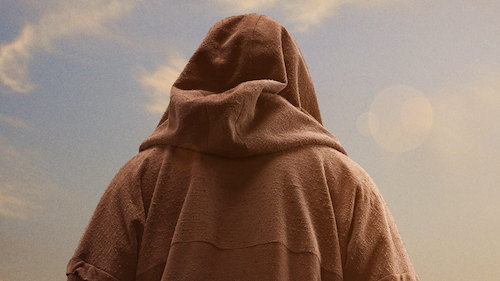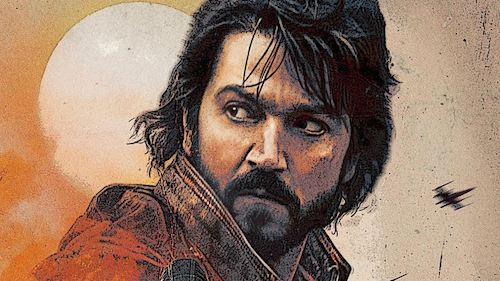
Star Tracks is our new soundtracks feature. It's only apt that the inaugural edition focuses on Hollywood composer John Williams (Star Wars).
John Williams may be retiring from composing movie soundtracks but he leaves an enviable Oscar-winning legacy that will be enjoyed for generations to come.
So what better time to revisit one of his 'lost' soundtracks, SpaceCamp?
Nick Smith, our resident US-based media maverick, goes on a sonic space adventure courtesy of the fine folks at Intrada.
Guest post by Nick Smith
Sometimes I think it would be great to have my life scored by John Williams! Imagine how much more exciting laundry, washing up or walking the dog would be with the maestro’s trademark horn section parping around on a spin cycle.
Sadly, Williams recently announced that he is retiring from scoring after Indiana Jones 5. Furthermore, I wouldn’t dare deign to ask him to help me scrub my dishes. But there’s no arguing that if adventure music had a name, it would be John T. Williams.
After all, he’s composed some of the most iconic soundtracks of our generation – Star Wars, Superman: The Movie, Close Encounters of the Third Kind, Jurassic Park, Heidi… he adds oomph to every score he composes.
SpaceCamp is a case in point.
The 1986 film stars Steven Spielberg's (Jaws) wife Kate Capshaw (Indiana Jones and the Temple of Doom), Lea Thompson (Back to the Future) and a very young Joaquin ‘Leaf’ Phoenix (Joker), who I can only picture in my head with his grown-up face on a child’s body. It is an exciting, glossily-filmed romp about some kids who go to NASA space camp, end up in space and have to find a way to get home.
The family film is beloved by the two Gen-Xers that I polled. While it’s no blockbuster, it sounds like one, thanks to the incidental music. This score is not phoned home – it sounds like space if you could actually hear anything in space.
Record label Intrada obviously recognizes the simple brilliance of this soundtrack, pulling out all stops with its new 2-CD release. SpaceCamp includes new tracks and cues missing from the original ‘80s album. Intrada has taken the original three-track film mixes, adding great depth to the score program with new stereo audio. The 1986 RCA release has been remastered with a hi-res transfer.
The music is worth the fuss and holds up well, although the synth-and-slap bass-heavy training montage sounds deliciously dated. The Main Title evokes a sense of amazement from the get-go with wistful horns and strings. Percussion stands in for twinkling stars. Williams said he,
‘tried to express the exhilaration of this adventure in an orchestral idiom that would be direct and accessible.’ He wanted the music to speak, ‘directly to the “heart” of the matter.’
It's easy to forget how impressive the space shuttle was in the early ‘80s, promising to revolutionize space travel. We’d be on Mars by teatime! Tragically, the Challenger crew was lost when the ship broke apart. The promise was not kept. Since the heroes of SpaceCamp get into difficulty in a shuttle and there were similarities to the real-life Challenger disaster, the movie was not as heavily marketed as it could have been at the time and the soundtrack was not released on CD until 1992.
Williams’ track The Shuttle is imbued with majesty and innocent wonder, with little hints of John Barry’s Moonraker score. There are plucking strings for the plucky youths and a boosting crescendo.
The Computer Room is made to sound like hallowed ground, building an atmosphere of awe. Friends Forever uses flutes to represent the magical power of camaraderie.
Once the campers are In Orbit, we hear a waltzing rhythm with violin trills and plenty of horns to suggest the breaking immensity of space.
There are echoes of other movies in all the right places; the danger is evoked in White Sands (film version or album edit) with motifs reminiscent of Close Encounters of the Third Kind, Star Wars and the BMX bike chase from E.T. the Extra-Terrestrial. Two other tracks have the merest nod to Richard Strauss’ Also Sprach Zarathustra fanfare.
But there’s plenty of original material, including a discordant moment and whirling, keening violins in Andie is Stranded and playful flutes in Viewing Daedelus, which could have been titled Dancing with Daedelus. Speaking of track titles, my favourite is I Can’t Reach It, which had me looking for a track called Help I’ve Fallen and I Can’t Get Up (there isn’t one).
Even the shortest tracks, new to this release, have weight. They’re not just functional cues but tunes in their own right. In Re-Entry, for example, you can sense the elation and relief of the heroes; the happy little trumpets gave me goosebumps before a train-like rhythm brought me down to earth. Home Again revisits earlier cues and ties the whole score together.
Intrada has created a worthy release for an overlooked film and soundtrack, reminding us that while some experiences happen once in a lifetime, magnificent music is always worth revisiting.
What are your memories of SpaceCamp and have you listened to the joyous and uplifting soundtrack? Let me know in the comments below.
Special thanks to Roger Feigelson at
Intrada for providing a copy for review.













